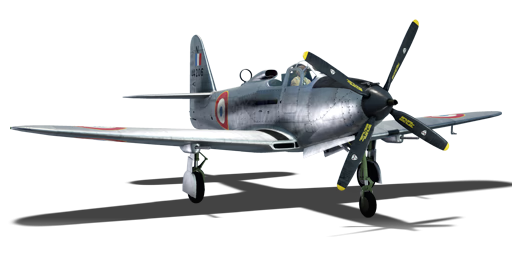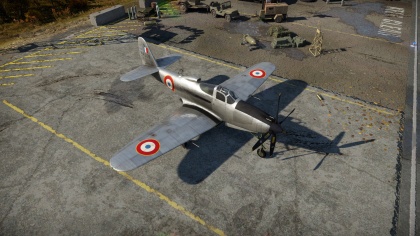P-63C-5 (France)
Contents
| This page is about the French fighter P-63C-5 (France). For other uses, see P-63 (Family). |
Description
The ▄P-63C-5 Kingcobra is a rank III French fighter
with a battle rating of 4.0 (AB/RB) and 4.7 (SB). It was introduced in Update 1.73 "Vive la France".
The aircraft is a high altitude interceptor/ energy fighter, with it's turn radius slightly better than before. The quick dive speed and high energy retention allows the player, with the correct altitude, to engage opponents below numerous times using the high yo-yo method. This aircraft should not be used for ground attacking due to it's average ammo count.
The 37 mm M10 cannon is ridiculously powerful. Aim carefully when firing, and do not fire too quickly, lest your gun jam and you lose your main weapon. A single shot to a wing or fuselage of an enemy plane will be all that it takes to bring it down.
The M2 Brownings are similar to the guns on the Bf-109 spotters. Use them to judge the range for your cannon shot. They are almost useless (except for those lucky pilot snipes) offensively.
General info
Flight Performance
Describe how the aircraft behaves in the air. Speed, manoeuvrability, acceleration and allowable loads - these are the most important characteristics of the vehicle.
| Characteristics | |||||||
|---|---|---|---|---|---|---|---|
| Stock | |||||||
| Max Speed (km/h at ?,000 m) |
Max altitude (meters) |
Turn time (seconds) |
Rate of climb (meters/second) |
Take-off run (meters) | |||
| AB | RB | AB | RB | AB | RB | ||
| 626 | 609 | 12500 | 24.2 | 25.1 | 16.8 | 16.8 | 289 |
| Upgraded | |||||||
| Max Speed (km/h at ?,000 m) |
Max altitude (meters) | Turn time (seconds) | Rate of climb (meters/second) |
Take-off run (meters) | |||
| AB | RB | AB | RB | AB | RB | ||
| 710 | 663 | 12500 | 22.3 | 23.0 | 29 | 21.7 | 289 |
Details
| Features | ||||
|---|---|---|---|---|
| Combat flap | Take-off flap | Landing flap | Air brakes | Arrestor gear |
| ✓ | ✓ | ✓ | X | X |
| Limits | ||||
|---|---|---|---|---|
| Wing-break speed (km/h) |
Gear limit (km/h) |
Combat flap (km/h) |
Max Static G | |
| + | - | |||
| ??? | ??? | ??? | ~?? | ~? |
| Optimal velocities | |||
|---|---|---|---|
| Ailerons (km/h) |
Rudder (km/h) |
Elevators (km/h) |
Radiator (km/h) |
| < ??? | < ??? | < ??? | > ??? |
| Compressor (RB/SB) | ||
|---|---|---|
| Setting 1 | ||
| Optimal altitude | 100% Engine power | WEP Engine power |
| ?,??? m | ??? hp | ?,??? hp |
Survivability and armour
- 38 mm Bulletproof glass in front of pilot.
- 12.7 mm Steel plate behind pilot's top body.
- 6.35 mm Steel plates on cockpit doors.
- 19.05 mm Steel plate behind 37 mm autocannon.
- 15.87 mm Steel plates in front of pilot's feet.
- 12.7 mm Steel plate behind engine.
Armaments
Offensive armament
The P-63C-5 (France) is armed with:
- 1 x 37 mm M4 cannon, nose-mounted (58 RPG)
- 2 x 12.7 mm Browning M2 machine guns, nose-mounted (250 RPG = 500 total)
- 2 x 12.7 mm Browning M2 machine guns, nose-mounted (200 RPG = 400 total)
The four machine guns are arranged in bundles of two mounted, all mounted in the nose of the aircraft. The 37 mm M4 cannon is mounted inside the propeller shaft and fires through the propeller hub.
Suspended armament
The P-63C-5 (France) can be outfitted with the following ordinance:
- Without load
- 3 x 500 lb AN-M64A1 bombs (1,500 lb total)
Usage in battles
It is recommended to use the P-63 against large fighters and bombers. It is far easier to hit a bomber with the cannon then a small fighter with it.
Head-on attacks are not advisable- the large cannon combined with the relatively weak M2s make for poor head on accuracy. Only engage in head-ons if you are absolutely confident in your aim.
Boom and Zooming is also an effective tactic with this plane. It's large cannon makes getting shots while diving relatively easy, and its high climb rate and energy retention can get it to safety.
Bomber hunting is also extremely effective with the P-63, a large bomber is far easier to hit with a massive cannon. A single shot can take off a bomber's wing. However, don't spam the cannon. Keep the delay between shots at a 1-1.5 seconds. Firing too quickly will result in a jam, which makes your plane almost useless offensively.
Manual Engine Control
| MEC elements | ||||||
|---|---|---|---|---|---|---|
| Mixer | Pitch | Radiator | Supercharger | Turbocharger | ||
| Oil | Water | Type | ||||
| Controllable | Not controllable | Not controllable | Not controllable | Separate | Not ontrollable | Not controllable |
Modules
| Tier | Flight performance | Survivability | Weaponry | ||
|---|---|---|---|---|---|
| I | Fuselage repair | Radiator | Offensive 12.7 mm | ||
| II | Compressor | Airframe | New 12 mm MGs | ||
| III | Wings repair | Engine | Offensive 37 mm | FMBC mk.1 | |
| IV | Engine injection | Cover | New 37 mm cannons | ||
Pros and cons
Pros:
- Excellent dive speed
- Excellent energy retention
- Better-than-average climb rate
- Good flat out speed
- Good cannon damage
Cons:
- Average turn time
- Worse-than-average performance at low speeds
- Ineffective armament against higher rank aircraft
- Prone to engine damage when being chased
History
The next production version of the Kingcobra was the P-63C. The first P-63C production block, designated P-63C-1 (company designation Model 33C-1), differed from the P-63A by being powered by the uprated Allison V-1710-117 engine with a war emergency rating of 1500 hp at sea level and 1800 hp with water injection. The wingspan was reduced by ten inches to 38 feet 4 inches. Apart from the more powerful engine, the P-63C-1 was basically similar to the P-63A-10.
The next P-63C production block was the P-63C-5. The most noticeable change introduced by the P-63C-5 was the addition of a ventral fin underneath the aft fuselage, intended to improve the directional stability. Total weight of armor rose to 201 pounds. Some of the earlier P-63C-1s were retrofitted with the ventral fin, but may not have been fitted to all aircraft.
The first P-63C deliveries took place in December 1944, with the total production being 1227 aircraft. Most of these aircraft were delivered to the Soviet Union, although 114 were delivered to the Armee de l'Air.
Serials of the P-63C series were as follows:
42-70686/70860 Bell P-63C-1 Kingcobra 43-10893/10932 Bell P-63C-1 Kingcobra 43-10933/11132 Bell RP-63C-2 Kingcobra 44-4001/4427 Bell P-63C-5 Kingcobra 43-11133/11717 Bell P-63C-5 Kingcobra
Specificaion of the Bell P-63C Kingcobra
Powerplant: One Allison V-1710-117 engine with a war emergency rating of 1500 hp at sea level and 1800 hp with water injection. Performance: maximum speed 410 mph at 25,000 feet. An altitude of 25,000 feet could be reached in 8.6 minutes. Service ceiling was 38,600 feet. Weights: 6800 pounds empty, 8800 pounds gross, and 10,700 pounds maximum takeoff. Dimensions: Wingspan 38 feet 4 inches, length 32 feet 8 inches, height 12 feet 7 inches, and wing area 248 square feet. Armament: One 37-mm cannon in the propeller hub, plus four 0.50-inch machine guns, two in the fuselage and two in underwing gondolas.
Media
Excellent additions to the article would be video guides, screenshots from the game, and photos.
See also
Links to the articles on the War Thunder Wiki that you think will be useful for the reader, for example:
- reference to the series of the aircraft;
- links to approximate analogues of other nations and research trees.
External links
Paste links to sources and external resources, such as:
- topic on the official game forum;
- encyclopedia page on the aircraft;
- other literature.
| France fighters | |
|---|---|
| Dewoitine | D.371 · D.371 H.S.9 · D.373 · D.500 · D.501 · Pallier's D.510 · D.520 |
| Morane-Saulnier | M.S.405C1 · M.S.406C1 · M.S.410 |
| Arsenal | V.G.33C-1 |
| Bloch | M.B.152C1 · M.B.157 |
| Caudron | C.R.714 |
| Sud-Ouest | S.O.8000 Narval |
| American | H-75A-1 · H-75A-4 · ▄P-39Q-25 · ▄P-40F-5 Lafayette · ▄P-47D-22-RE · ▄P-63C-5 · F-6C-10-NA |
| ▄F6F-5 · ▄F6F-5N · F4U-7 · ▄F8F-1B | |
| Other countries | ▄Seafire LF Mk.III · ▄Yak-3 · Challe's ▄Yak-9T · NC.900 |
| Belgium | ▄Gladiator Mk I · ▄Spitfire FR Mk XIVe |
| Netherlands | ◘Sea Fury FB 51 |





